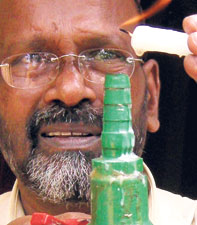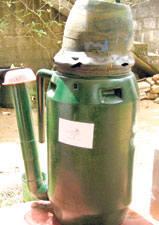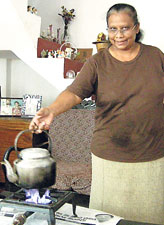At first glance, Srimal Tissera’s house in Pannipitiya is no different from any other in the neighbourhood. Once you enter his garden, however, you cannot help but notice several plastic barrels, containers and pipes lined up against the garden wall. These are various stages of an ingenious system that Mr. Tissera has been single-handedly developing over the past six months – a portable domestic biogas plant.
 |
| Srimal Tissera: His lack of technical expertise did not deter him from his goal. |
Inspired by methods used in Germany, India and various other countries, Mr. Tissera decided to develop a biogas-producing-system suitable for Sri Lankan homes. He is not a scientist by profession and has no technical expertise. He works as an export consultant, compiling project reports for various companies but this was a challenge he took up in his spare time.
He developed this portable biogas plant and the bacterial culture through trial and error, with only his family’s unwavering support behind him. His idea was one borne out of passionate enthusiasm and his aim was to create an environmentally-friendly alternative to the cooking fuels currently being used in Sri Lankan households.
Has he succeeded? Mr. Tissera, an old boy of Thurstan College Colombo, believes that his system is capable of cutting down the average household’s LP gas consumption by about 50%. Since the system uses kitchen waste as raw material, it allows one to make productive use of household garbage. This system gives out liquid compost as a by-product which can be diluted and used as plant fertiliser. The blue flame produced by this method is extremely energy efficient.
It is an established fact that biogas is one of the most environmentally friendly energy sources that can be used for cooking purposes. The system developed by Mr. Tissera is in contrast to the conventional system, extremely user-friendly and easy to implement. The conventional method uses cow dung- which is not easily accessible to the majority of households in present times.
The conventional biogas producing system currently available in Sri Lanka is very costly to set up and requires a large area of about six square metres. The new system requires an area of about two square metres. The raw material can be anything from general kitchen waste, to rotting vegetables to plant material. Only about two kilograms of raw material is needed to obtain a daily supply of biogas through this new system.
Once the raw material has been transferred into the system, it takes only three days for the anaerobic reaction within to be completed as opposed to forty days with the conventional system.
 |
 |
| The fuel-saving contraption |
Boiling a kettle of water using the household biogas plant |
The new system itself is surprisingly compact considering what it is capable of. It consists of a large tank (the fermenter), a pipe through which the raw material and initially the bacterial culture can be transferred to the system, an outflow tract through which liquid compost can be obtained as a by-product and a gas holder on top of the tank with a pipe through which the gas can be extracted. This pipe can then be connected via tubing to your cooker to obtain an energy efficient, clear blue flame. Mr. Tissera has also incorporated a hydrogen sulphide filter into the system to filter out the foul-smelling hydrogen sulphide produced during the fermentation process.
Rural households that use firewood for cooking purposes consume about three tonnes of firewood annually. Not only does this release about five tonnes of CO2 into the atmosphere, but it also causes air pollution within these households which can lead to respiratory infections. Households which use kerosene release about 600 kilograms of CO2, whereas with LP gas it is still a staggering 300 kg of CO2 released into the atmosphere annually. All this can be prevented by switching to a cooking system that uses biogas.
Having already patented his invention, it is Mr. Tissera’s wish that his idea will be taken up by a government authority and made available to the general public. He believes that with government backing and sufficient capital he could develop the system even further, taking it to even greater heights. So far the feedback he has received from those he has approached has been somewhat negative. Yet, he refuses to give up.
The depletion of energy sources and the destruction of the environment are major crises facing not only Sri Lanka but the entire world. Srimal Tissera believes that his invention can make a truly positive change. |



